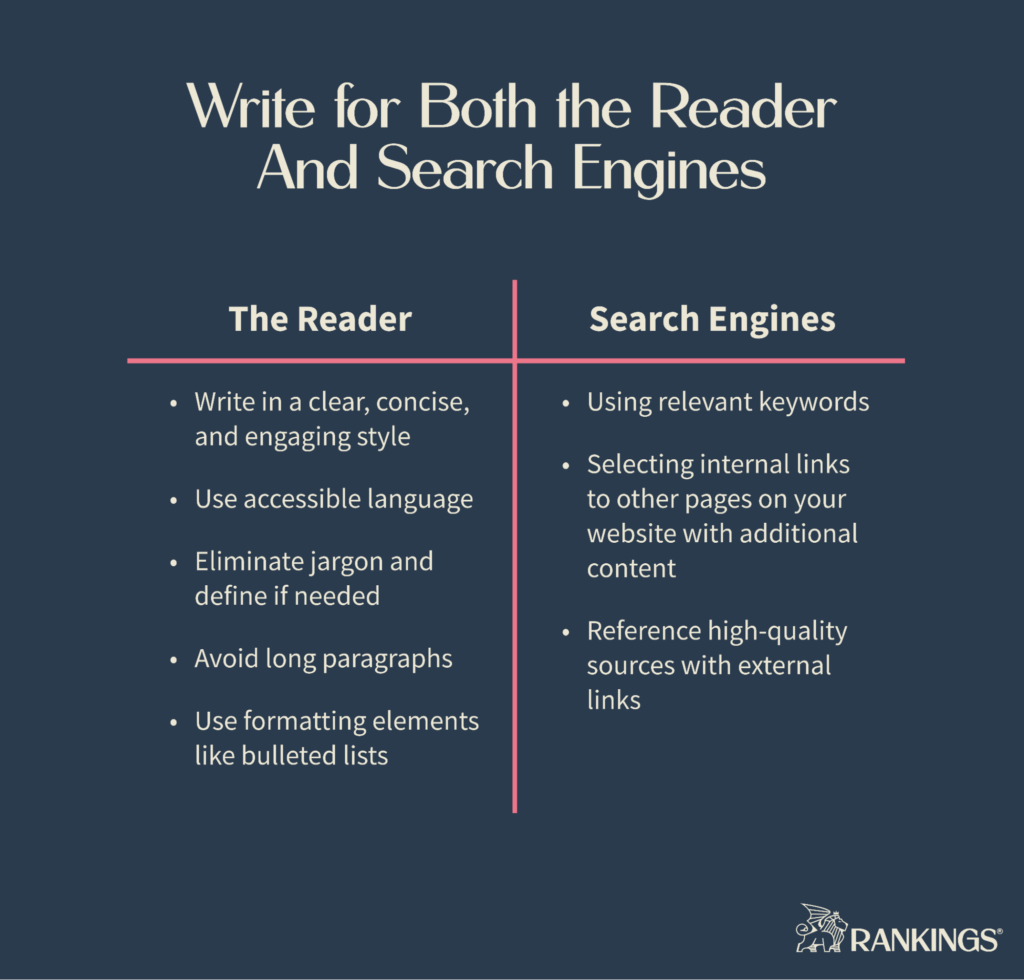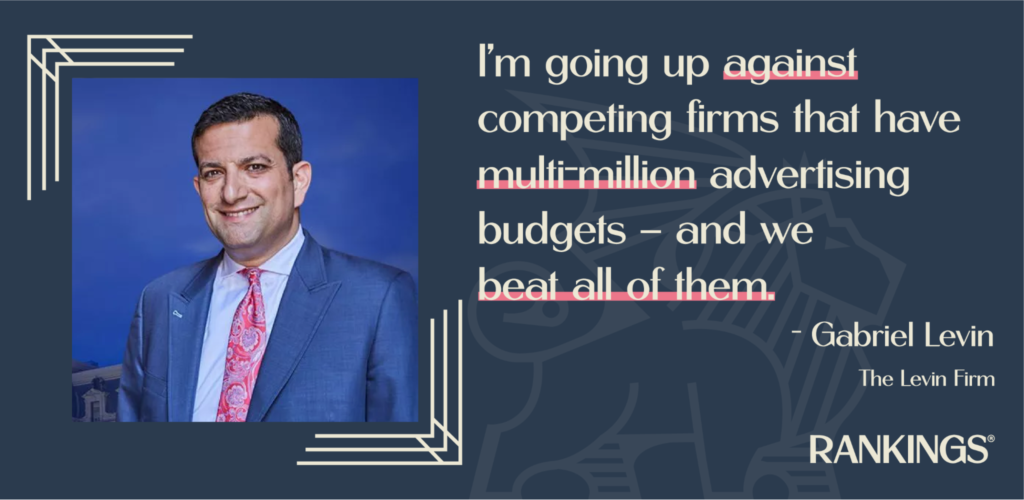Over 70% of people would rather get information from blogs than through traditional advertising. That means blog posting is necessary for law firms that want to grow their business through organic traffic from Google.
When written well and with the right law firm marketing strategy, your blog can help you grow your law firm.
Through your blog, you can answer common questions from your target clients, address how you approach legal problems, and showcase your knowledge. But many lawyers are unaware of the most important things to consider when writing a blog post.
By following the tips below, you can get more out of your writing and set yourself up for an increase in new cases.
1. Identify Topics of Value to Your Target Audience
The process of writing a blog starts well before putting words on the page. A great law firm blog takes keyword research and planning to get the best results.
Many lawyers make the stake of writing topics at random and hoping that something meets their audience’s needs. Planning ahead helps you find the topics your ideal clients actually care about. It increases the likelihood that they will find your content online.
You may already have some ideas of the topics your clients care about. That’s a great place to start brainstorming ideas for topics. After considering your clients’ most common questions and problems, you’re ready to get into keyword research.
When you do keyword research, you’ll find all the different ways that people search for the services you offer. You’ll find the common questions you hear all the time.
These keywords map directly to topics you might want to add to your content plan and inform your content strategy.
But you’ll also find the topics you didn’t even know your prospective clients cared about.
These make excellent topics for articles that address unique needs. They also allow you to share your insights and build trust with underserved audience members.
2. Balance Your Audience’s Needs with SEO
When you write on the web, you’re really writing for two audiences. First are the people that your law firm serves. Second is the search engine that helps these potential clients find your content.
To get the best results from your blog, you’ll need to balance the law firm SEO tactics with your target audience’s needs. Great blog posts are created for people while keeping search engines in mind.
Before you begin writing an article, look at the pages that rank on Google for that topic.
Doing so will give you an idea of what people are looking for when they perform that search. It helps you determine the “search intent” for the topic. It will also show you the types of content that Google tends to rank for the topic.
This information is critical.
It helps you decide what your title or headline needs to be. It helps you choose the format for your article (e.g., whether it’s a guide, a list, or something else). Finally, it can help you figure out what content should be in the post.
As you write an article, consider both how you’ll connect with the reader and how search engines will try to understand the content.

Here are some of the best ways to write for reader connection:
- Write in a clear, concise, and engaging style
- Use language that is accessible to non-lawyers
- Eliminate jargon and terms of art, and define them if they must be used
- Avoid long paragraphs
- Use formatting elements like bulleted lists to break up text into scannable sections
At the same time, draft with the search engine in mind, too, by doing things like:
- Using relevant keywords
- Selecting internal links to other pages on your website with additional content
- Reference high-quality sources with external links
One thing that helps both readers and search engines is using subheaders to break up content. This makes the post more digestible and also highlights the major concepts of the piece.
By combining aspects of writing for people and for search engines, your blog is positioned for better performance than posts that focus on one over the other.
3. Write with Authority
As a lawyer, your expertise matters to your clients. Your blog is an outlet to demonstrate expertise to both readers and search engines.
Take the time to write credible, accurate, and valuable content. Drafting informative and authoritative blog posts shows your clients your familiarity with the law. By helping them find answers to their questions, you also demonstrate the value of working with you.
Writing with authority isn’t just important for connecting with readers. Google cares about expertise, authority, and trustworthiness (or EAT) in the content that it indexes.
It uses these metrics to decide which content to trust over others, so each piece you create should be infused with all three.
In addition to speaking from experience in your blog, you’ll also want to cite sources. Back up any claims you make with evidence to show you’ve done your research and take your blog seriously.
Many lawyers struggle with balancing authority and simplicity. It’s easy to fall into the trap of writing “expert-level” content by stuffing in formal language and jargon.
Writing over someone’s head to show your level of knowledge will backfire. It can make clients feel like you’re condescending or that you won’t be able to communicate well with them. Write in an accessible way in each post.
4. Create Engaging Headlines
You only have a few seconds to get someone’s attention. One way to grab that attention is with enticing headlines for each blog post.
But doing so requires a balance between SEO best practices and understanding your audience.
The best headlines don’t just use titles that pique someone’s interest. They also use relevant keywords to help search engines understand what the content is about.
No one wants to read Statutory Negligence Concerns for Comparative Fault in Georgia. It might be a little too dry of a title for your audience. The same reader may want to know the answer to What Are Georgia’s Accident Fault Rules?
Both articles might cover the same information, but one has a better headline. At the same time, the second one uses keywords that your target audience actually uses to find the information they need.
Using power words and emotional triggers in your titles can create a sense of urgency or interest. These can be helpful in crafting a title but always come second to search intent.
Here are some headline styles that generate interest:
- X Mistakes to Avoid with ___
- X Reasons Why You Must ___ in Your ___ Lawsuit
- How to ___ While ___
- What You Don’t Know About ___ Could Hurt You
The goal is to accurately portray the information in your blog post while getting someone interested in reading beyond the headline.
5. Write for Scannability
The way that people read content on the web is different from the way they may read a book or magazine.
When people search for answers to their questions on Google, they want that answer as soon as possible.

As a result, they’ll open a few relevant results for their question and scan through each to see if they can find their answer. The fact is, most people don’t read online content one word at a time.
Instead, they scan to see if it’s relevant to them. If not, they hit the back button and leave your site entirely.
Writing for the online reader may be different from any kind of writing you’ve done before. If you want to capture their attention, your top priority should be answering their questions as directly as you can.
Beyond that, there are some readability tricks you can use to make your content scannable.
Use short paragraphs, bullet points, and headings that direct their attention to what is most valuable for that reader. Long walls of text are difficult to read for anyone and may also be intimidating.
6. Repurpose Your Blog Posts for Multiple Channels
Law firm content marketing is about more than just blog posts. If you put in the work to create a solid blog post, you probably also want to get as much traction out of it as possible.
You can get more mileage out of your blog content by repurposing the ideas for other attorney marketing channels.
The ideas that you cover in your blog are a great jumping-off point for social media marketing content or video marketing for lawyers. If your law firm has an email newsletter, you might even repurpose your content for those readers.
7. Measure Your Success and Optimize
If you’re investing your time and effort into blogging, you’ll want to make sure that effort’s paying off.
It’s well worth setting goals for your blog at the outset. Once you’ve published content for a while, you can revisit your goals and compare them to your blog’s actual performance.
Many analytics tools are available to track your blog’s performance and engagement. These tools can provide a lot of detail on performance but are often highly specialized. Most lawyers choose to outsource tracking to an SEO professional.
One of the best parts about writing a blog is that nothing is set in stone. Your blog is a living thing, unlike printed material.
If a certain blog post isn’t performing the way it should, you can always return to optimize it. On-page optimization can help you improve your rankings, drive increased traffic, and net you more new clients.
With the right data analytics tools in place, it’s easy to see where you have the most opportunity to improve older posts.
8. Consider Outsourcing the Blog Writing Process

Even if you have the time to write and publish consistently, there’s a good chance it’s not the best use of your time.
Writing for the web is highly specialized. Just like writing a motion or legal brief, blogs have their own unique nuances. It may be unlike any kind of writing you’ve done before. Most lawyers are better off focusing on their firm rather than trying to figure out the rules of blog content creation.
It’s true that blogging is valuable for generating traffic to your law firm website. It’s also time-consuming to stay on top of writing new posts or optimizing old ones while still making time for your clients.
Partnering with a professional can prevent you from losing that valuable time. A professional law firm marketer can take over this aspect of reaching your audience for you by handling things such as:
- Planning out your content
- Regularly publishing high-quality content that aligns with your attorney marketing plan
- Promoting your blog
- Repurposing your blog content for other channels
- Measuring your blog’s performance and engagement
- Optimizing your content for continued results
Working with dedicated, outside professionals can help attorneys reach new levels of productivity. When you outsource content marketing, your to-do list becomes more focused on helping clients, not taking on routine marketing tasks.
Invest in Content Marketing Now
If you know you want your website to do more for you, finding the right person to help you with blogging is your next step.
The team at Rankings.io knows what it takes to get a law firm ranking for ideal keywords. Contact us today to learn more about how we can help you implement an effective content marketing plan.
The post 8 Tips for Effective Blog Writing for Lawyers appeared first on Rankings.




